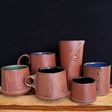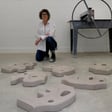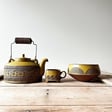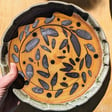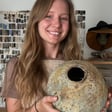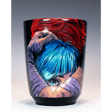Finding Your Unique Voice in Pottery
00:00:00
Speaker
Hey, real quick before we get started. If you would like to find your own theme for your pottery so you your voice really stands out and you're not getting bored with making the same thing over and over again, I put together 53 themes for you guys and it's completely free.
00:00:18
Speaker
All you have to do to get it is just go to shapingyourpottery.com forward slash themes. I'll see you guys in there.
00:00:31
Speaker
If you love pottery and want to take your skills to the next level, you're in the right place. Find your own pottery style right here on Shaping Your Pottery with Nick Torres. Let's get started.
Centering Clay: Essential Techniques
00:00:42
Speaker
Charlie, welcome Shaping Pottery and share with me what is something you believe everyone in the pottery world should be doing? This one's tough for me. i Partially because I teach and I like see like a lot of students do a lot of different things. And so I try not to try to steer anybody in any specific direction, but there are a couple of things that I try to get them to do.
00:01:01
Speaker
And one, i teach them to center without bending their wrists. And I think like for like longevity, you're going to make pots for a long time. you got to think about the ergonomics of of how you work. And I think that a lot of times if you're centering and you're putting a lot of pressure on your wrists when you're doing it, it's probably not good like long-term for carpal tunnel and other issues.
00:01:22
Speaker
Absolutely agree. Definitely agree. A hundred percent.
Discovering Pottery: A Personal Journey
00:01:25
Speaker
So tell me the story, how you got started making pottery. When I was in in elementary school, I, well, I, when I was in second grade, they figured out my parents figured I was dyslexic. I, I got tested and they sent me to a small school that had a program for dyslexic students.
00:01:44
Speaker
And at that school, the art classes were around clay a lot. And so I was like building little animals and stuff like that pretty early and on with clay.
00:01:56
Speaker
And as I got, as I got older and through that school, I think I middle school, probably fifth or sixth grade. I saw a potter's wheel. I knew what it was. And I asked my teacher if I could do it. And she said, she said, it's too difficult and too many students would want to do it if she let me do it. But she turned me on to Goucher college's summer camp.
00:02:15
Speaker
where they had a potter, they had like an arts, like a three week arts session. And so you'd go and you stayed there ah in the dorms and and you worked in one medium.
00:02:26
Speaker
And so I worked and worked in clay for for three weeks. He had to like apply to get in. And that's when I really like learned to make pots. So I was about 13 years old. Do you remember what you were feeling when you first started throwing on the wheel?
00:02:40
Speaker
I still, I know it was hard. mean, I can look at those pots and I'm like, I know was hard. And there are some people in there who are like more skilled than I was. Cause I've just never seen their pots and be like, ah, how do they figure out how to do that?
00:02:52
Speaker
I don't that's yeah. From like 13, that's not. Maybe what I was focusing on, it was like a summer cube. I mean, it was, we were there every day just in the studio, but I think I remember other things about that camp, maybe like more than actually being in the studio, but just kind of funny to me.
Creative Inspirations: Beyond Traditional Influences
00:03:12
Speaker
that. So you contribute growth as an artist to a teapot you made when you were in college based off a woman spinning. yeah Tell me more about this. So when I was a senior in college, my girlfriend at the time was doing thesis in fashion and she had a, like a, a book that just had like color plates of images of like fashion images.
00:03:32
Speaker
And one was this woman turning in a long dress and the dress was like just off the floor. And it was just like beautiful, like flowing motion to the dress. And I, and I remember looking at it and saying like, I'm going to make a teapot that captures that ceiling.
00:03:47
Speaker
And it took me about, it took me about a year to do it. And really my, my teacher at the time, Lisa Young came in and i was, I had been working on these teapots and she said, why don't you flip it over and like, and paddle the bottom.
00:04:02
Speaker
And I hadn't even like thought about like taking this like form and, and transforming it that way. And like turning it over, like, you know, as like a new pottery suit, like the idea of like taking a paddle to like the bottom of your pot is, you know, it was like crazy to me. So I did that though. And it really transformed that, that piece to to have that feeling of that, like dress being like slightly lifted off the ground or like moving or the motion of that.
00:04:25
Speaker
But it was really the first time I had like looked outside of the surrealism. I wasn't looking at anybody else's other pots. I wasn't like trying to replicate something I'd seen of the elves do.
00:04:37
Speaker
It was really just like, Hey, I'm going to, I'm going to take this idea and I'm going to see if I can make it in clay. And how did this moment help you with the work that you can you make now?
00:04:48
Speaker
Well, so there was, up for a long time, i wasn't painting on any animal images on the pots. And so those pots were like a a lot about motion. And so I was like doing like a lot of building and cutting and and altering.
00:05:01
Speaker
And I think that that just like led me to like a lot of techniques that I still use today when I'm making pots. But I think just like that idea of like looking elsewhere for inspiration instead of the clay world.
00:05:14
Speaker
Absolutely love that. Shape Nation, you don't have to find inspiration just in the clay world. You can find inspiration anywhere out there and it can lead you to creating something amazing. Absolutely love that.
Painting Animals on Pottery: A Personal Touch
00:05:25
Speaker
So can you tell me about the moment when you started making your animal paintings onto your pottery? Yeah. So i i had I bought a house and I built a studio in the backyard. And luckily my cousin and his really good friend he grew up with had both framed houses before. And so they came over and I had some friends in town and we like put this like 20 by 20 square foot studio up and over a weekend.
00:05:50
Speaker
And it was a summertime. So fall came around. i was like, I better put some insulation in the wall. So I've inflated the wall. And in the spring, there was like no, eat nothing under the eaves, right? it was like, no, nothing like blocking anything from like coming up under the eaves. So in the spring, the Carolina wrens came up under the eaves and made nests in the top of the installation.
00:06:11
Speaker
And so I had these Carolina wrens like living in the studio and they're like raising their babies in the studio. And at the same time, my wife came with a, with a black rabbit and, and that rabbit was just,
00:06:26
Speaker
part of my life as well. We had dogs and this rabbit and the rabbit would like run around the house and like, you know, like hanging out with the dogs. And around that time, I just, I started like thinking about like putting some of this stuff on pot. So I think the rabbit was getting like a little bit older and maybe near the end of its life. And I'm like, oh, I want to capture this rabbit on a piece of pottery.
00:06:46
Speaker
And I was using ash glazes at the time. but these pots that were like fluid and had motion till. and And so I just sort of like started to paint and sprayed this ash glaze over the paintings. And the first ones, like i remember the, I had this ears and this rabbit just ran down into its face because I put too much glaze on it.
00:07:06
Speaker
And so was like really trials and error at the beginning. And i knew a little bit, I, I had used ash glaze for a while. And this is sort of like on topic, but I and was in Atlanta for a about two years and it's hard to get wood ash down in Atlanta. Not a lot of people have fireplaces.
00:07:24
Speaker
And so I thought at some point, i I'm going to ask them barbecue places if I can get ash from them. I figured be hickory ash, it'd be good ash. And so I did, I got like a five gallon bucket or so of ash from hickory places.
00:07:36
Speaker
And they probably had great, that were like, rusting metal and that stuff was falling into the ash. And so occasionally i get this big iron spot on a piece. And when I moved back to North Carolina, i was happy to not have this iron spots, but then it's kind of started to miss them a little bit. So I started putting like little dots of iron on the pots and then they became lines and then bigger dots.
00:07:58
Speaker
And then that's how I sort of figured out that I could like paint with iron wash. and And that moved into like painting that rabbit iron washing like a black wash. Why were you missing the iron spots from the ash please?
Embracing Iron Spots and Ash Glaze
00:08:12
Speaker
It's does this beautiful thing. If you put some iron down that the ash please will run down and it'll go around the iron. And it's almost like, it's almost like this resist. And so you, so I figured I could like, when I kind of realized that I was like, I can make pattern with this.
00:08:27
Speaker
And sometimes when it wasn't like a really big, I mean, like I would get like a big iron spot, sometimes like, like a side of a vase. And I just felt, I just felt like it was ruined. Other people didn't think so. But for me, you know, like my vision of the work was like, ah, I didn't want to have that happen.
00:08:41
Speaker
But if there was like little iron spots and like watching that glaze move around, it was really beautiful. and So that was more of like thinking about those smaller iron spots um and putting those onto the pots. when I absolutely love that.
00:08:54
Speaker
So at first you were hesitant to continue painting onto your pots. Why are you hesitant and what changed your mind? Well, I think when you, when you, I felt like a real stepping out of my comfort zone to do that one,
00:09:10
Speaker
I didn't know a lot about painting. I wasn't a painter that, that made pots. I was really a potter that like started to pee. And so that was like a little bit uncomfortable. And I'd been going to these shows, these local shows and showing my work and I've been doing well.
00:09:25
Speaker
And I think when you make a change like that, you know, it's like the first time you put a rabbit on a pot and go to a show, you're like, oh, what are people going to say? What are people going to think?
The Art of Painting on Pottery
00:09:34
Speaker
And so. It was, all it was like a, was like a little bit nervous about it.
00:09:39
Speaker
I think it was, it was, those things were well received. I look back, I think the paintings weren't great, but they were like, they were different. And I think people like people just saw something in them and and they're well received.
00:09:52
Speaker
And so I continued to like add more paintings a little bit here and a little bit there until it it became predominantly, I pretty much don't make work that's not painted. There's very few pieces that don't have a painting.
00:10:06
Speaker
So you are inspired by timeout. I was going to say something to the audience. Shape Nation, it's important to get out your comfort zone because that's how your work grows.
00:10:17
Speaker
And that's how you're going to find your own voice. Absolutely love that. So you are inspired by animals and birds. What is it about animals that inspire you? Well, think as a kid, I thought I'd be a vet.
00:10:30
Speaker
found out how much schooling was involved and how hard the schooling was and being dyslexic. I was like, well, that's not going to, that's not going to be a good thing for me. So i was just always into animals. We had dogs and cats growing up and I just, we, we kind of lived near some woods and so I'd see animals.
00:10:45
Speaker
And so they always fascinated me. And then in ninth grade, went to the small school and in science class, instead of just having like chemistry or something they and like birds class. And so we like learned about birds for a semester. We studied birds and sort like the scientific method around like watching birds or recording information about birds. So that was sort of my love of birds happened that in ninth grade and started continued out. So I learned a lot about birds and learned a lot of like local birds.
00:11:15
Speaker
and And so then I would just like look for them. as was getting older. And so ah they they sort of played a role in my life since then.
00:11:27
Speaker
Talk to my kids about them, point out different types of birds, talk to them about them. Absolutely love that. So now what advice would you give to someone who wants to start painting on their pottery or elevate their paintings that they already do on their pottery?
Developing Unique Painting Techniques
00:11:41
Speaker
What did you got to do a lot of it? ah You know, when I look back at this decision I made, i think i had this ash glaze that I was really familiar with and I, and I, and I was putting iron down on it and maybe some black wash, but it's really not. If you're thinking about like painting pots, it's not a great method to, or it's not a great.
00:12:03
Speaker
set of materials to use. You have this like glaze that's really fluid and you have a material that's not as stable like under glaze. But I think because I did that, it make my pots unique that nobody was like, when you look out there, you don't see pots and don't I don't feel like I see work like mine.
00:12:23
Speaker
And so I would say ah a couple of things about starting painting, understand like what, what brushes understanding like brushes and how they work and what brushes do things well and what brushes don't do these well. So when I was a student and I tried to do this and I was using like the big Suomi brush that I got in drawing class, that's really like ah a mom to spread a lot of material down.
00:12:44
Speaker
And if you try to draw a line with it, it doesn't work. It's like terrible for drawing lines. And so I was looking at these like Japanese calligraphy, like stuff on pots and thinking like, how do they get this brush to do that? They must have some skill I don't have.
00:12:59
Speaker
Yes, they have a skill I don't have, but they also have a brush I don't have. And like getting that right, and giving getting the right tool to do the thing you want to do is super important. And so as I've, as I've like extended or like as I've built my painting skills, I've also really refined like what brushes I use to do certain things.
00:13:20
Speaker
and Absolutely love that. Yeah. So if you, so I think if you wanted to start painting on pods is to get get a wide range of brushes and figure out like what brush does the thing that you need it to do for the thing you're painting.
00:13:34
Speaker
Absolutely love that. Shape Nation, if you're thinking about starting paint on pots, first, you had to paint a lot to build the skills and then two, make sure you have the right painting tools to get the job done. So let's talk about the business side of pottery.
00:13:49
Speaker
You are, you call yourself a sometimes a full-time
Balancing Teaching and Pottery Career
00:13:52
Speaker
potter. Can you explain this to me? So I, I've been teaching half-time at Guilford College since the spring of 1999. And I'd been making pots full-time down in Atlanta before i came back. and Guilford's my alma mater. And I actually, i was looking at graduate school at the time. They asked me to come back.
00:14:08
Speaker
And I've been there since, and it's not a full-time job. So about 24 weeks out of the year, well, maybe it's 28 now i'm i'm I'm teaching two days a week.
00:14:20
Speaker
And so um in my studio the other three days a week. And then when I get busy, I'm painting at night and on the weekends. So I can, I can put in like 40 hours just on my work in a week when I'm really busy and combined with the teaching.
00:14:34
Speaker
And, and so there's, so I feel like there's some, sometimes where I feel like I'm full-time Potter and sometimes where I feel like I'm like a little bit less. And it's nice. It's been nice to have that income at this point, the, I don't get paid nearly what I make making pots from the teaching.
00:14:52
Speaker
So if I had to give one up for financial reasons, I have to give up the teaching. Shaping Nation, you don't if you're thinking about being a full-time potter, you don't have to just stick to pottery. You can teach, you can do other things to help supplement the income until you are ready to fully become a full-time potter.
00:15:10
Speaker
absolutely love that. Yeah, and certainly i think the advantage of like working in clay as this other job, this teaching job is really nice because i um my I don't feel like I got to turn something off and turn something back on when I get home.
00:15:25
Speaker
that I'm just sort of like, I'm sort of like talking about pots and thinking about pots and helping other people make pots and making pots all the time. Absolutely
Transitioning to Online Sales
00:15:34
Speaker
love that. So when you are selling your pottery, do you focus more on in-person shows or online sales?
00:15:41
Speaker
Well, up until the pandemic, I was pretty much all of my stuff was in person and I like built up a really great regional in-person show schedule.
00:15:52
Speaker
And then the pandemic hit. And I remember I had this former student who was like selling a lot, like all of her work online. And I thought, man, I should have like built up some sort of online presence before the pandemic.
00:16:05
Speaker
Not, you know, like not knowing that I wasn't going to be like going to any shows. And so when the pandemic hit, I basements, every pot I sold pretty much that year was online. And What I found was id I had been around, I've been doing this long enough and I've been in and like enough magazines and and books and shows that galleries and things that people around the United States knew who I was. And so those people like out in California and Oregon and stuff who are like, want to collect my pots, but couldn't because it, because I was mostly selling in person.
00:16:36
Speaker
And so when I went online, I, I was, I sold a lot of pots that year. And so now I'm selling probably half online, half in person. When you started promoting yourself more online, what was working for you or what is continuing working for you now?
00:16:53
Speaker
I was part of of a group of potters called Throwing Together Potters. And that includes like Ron Philback and Jen Macca and Julie Wiggins at the time. And now Michael Hamlin's in that group and Phil Harlem.
00:17:07
Speaker
And I'm probably missing and missing anybody. But that was, Ron had a lot of experience selling pots online. And so... One of my first, I think I had like a little sale online and then i did this online sale with the throwing together potters and, and having those folks to just like guide me through the online process was really great.
00:17:33
Speaker
And, and I learned, I used to hate the pack and ship pots. But I got like some Rand pack that, you know, that like paper, that accordion, when you like pull it, it was like die cut and like you wrap pots up really quickly in it. And so I got to the point where I can like pack up a really great show in like a day or two and and get it out.
00:17:54
Speaker
Absolutely love that. So you say having kids helped you with expanding your business. Can you tell me more about this?
Expanding Pottery Business as a Parent
00:18:01
Speaker
you have My first kid was honestly, was like, man, I need to sell some more pots.
00:18:06
Speaker
And mostly I'd been doing like small local things. So I started to apply to like bigger regional shows. And I just, I, I just felt this pressure like, oh, I gotta like start making some more money now if I'm with these kids on the way.
00:18:19
Speaker
and and And I think having that drive really helped me just get in the studio, make work, and think about it as this as this as this job that's going to provide for my family.
00:18:33
Speaker
absolutely love that. And what is your best advice to someone looking to sell more of their pottery? I think I still feel like If you can do anything local, anything that comes up local, if you're just like, kind of like looking to like build your, build your customer base, it's easier. i don't know if it's easier. i I think doing local stuff is great.
00:19:00
Speaker
And so for a long time, ah if somebody asked me to do something local, I pretty much do it. And, and I also feel like it's, but but Get an online shop. I do mine through Squarespace.
00:19:12
Speaker
It's pretty easy to mad to manage that. Just like drag and drop. You don't have to know any coding or anything. If you can like work a word processor and you can put an image on Instagram, you can pretty much do Squarespace.
00:19:24
Speaker
and And so they've got like a lot of tools. And I think there's like a lot of information out there about how to set that up. pretty helpful. Some excellent advice
Finding Artistic Voice Through Feedback
00:19:34
Speaker
right there. So let's talk about discovering your voice. Can you tell me about the moment when you knew you were heading in the right direction with your pottery?
00:19:41
Speaker
I'm still, I'm still trying to find it, Nick. I don't know. I think, i think it's not. Yeah. I don't, I feel like it seems like a place you arrive at. when you're not there.
00:19:53
Speaker
And then as you get older, you realize there is you never really arrived there. You're kind of, I'm kind of always working towards something. And I think that those things get smaller and smaller and they're not really big picture things that I'm working towards, but I'm trying to refine the details or maybe like, or maybe experiment with some new things.
00:20:14
Speaker
But when I, when I was painting on the pots and And I was selling a lot of those. And I think I, at that time i felt like i was doing things right.
00:20:27
Speaker
One of my former students came back to teach at Guilford for a semester and he lived with with us till Harlem. And um he was a student when I first got back. So when I first was teaching, I was like 26, 25, 26. And so he's, I'm not really that much older than him. I feel like I'm older than him, but then when he told me his age, it's like, well, we're like not that far apart.
00:20:48
Speaker
But so he lived with us. And at one point I remember him coming downstairs and like looking at my pot that had this room of pots and people came by to buy him. It was like the, the formal living room was full of pots.
00:21:01
Speaker
And he said, you looked at him, he was like, you know, the best pots you're making are the ones that you're like really getting in there and like painting them. And, and I was like, ah, I know, I know, but it takes so long. I can't do that on everything.
00:21:15
Speaker
But I needed to hear it. And it was like, ah knew it, but him saying it to me really changed my outlook. And I started to really get in and paint the pots. And I just, and I just upped the price. I just like raised the price on them and people were buying them. And I think that that was like a really turning point for me to like, to make work that I'm, that, that I'm continuing like continue to expand on, continue to push.
00:21:41
Speaker
And I feel really good about. What were you feeling when your former student told you that you need to be painting more pots? Well, I think ah was, it wasn't, it was like the detail, like like the level of detail. I needed up the level of detail. it I mean, it's like, it's one of those, don't know if you've ever had that experience where someone tells you something about your pots and you're like, hi, I know that. Or like, at least like it's there somewhere in your mind by hearing them put it to words, like, okay, yeah, I need, I need to do that better. Maybe it's like, maybe something small. Like, you know, your handles need some work and you're like, ah, know my handles need some work.
00:22:20
Speaker
But, you know, it's like when somebody voices that to you, like, it's like, boy you know, to your face, it's like, okay, I really, I do, I do, I need this work. I mean, it was like, it was a real gift to have that, to have that, to, you know, to be told that or to have that discussion with but somebody.
00:22:37
Speaker
Absolutely. Definitely agree too. So what would you say was your biggest obstacle when it came to finding your own voice or getting close to it? I think just when you're starting off, you're just trying to make the best pots you can. And, and oftentimes, you know, I, had that experience with that whirling teapot that was, i was getting information from other places, but I was also looking at other people's pots.
00:23:03
Speaker
And, and I think the biggest obstacle is you just have to make a lot of work. You just have, you have to go. You just have to go through so much clay to find and and and be in, have a certain level of skill with that clay to find your voice.
00:23:18
Speaker
Although sometimes I feel like one of with my students, students who struggle more at the wheel or to do things, they sometimes find their voice a little bit faster because they don't rely on like the technical, so that like the technical prowess of being able to throw well.
00:23:34
Speaker
And so they, hit they sort of have to like, sort of like figure out like how to, how to like make their pots better without just like building a skill on the wheel. And so you might delve into other areas.
00:23:47
Speaker
But for me, it's the, the path, the path was like long and there are certainly lots of turns I didn't take. And I don't think that they necessarily led me to my voice, but they certainly led me to where I am today.
00:24:04
Speaker
And I could be someplace else making great pots that are different, but this is, this is the place I came to through the process or through the decisions I made.
Sustaining a Pottery Career with Sales
00:24:15
Speaker
Yeah. Champion Nation, make a lot of work. That's how you're going to find your voice or be starting head in the right direction simply by making a lot of work. Yeah. And I think also, i think also being in like an academic setting, like I,
00:24:29
Speaker
oh of questioning my, or like, you know, like being curious about my work and being curious about the results and letting that like lead me. And I think it's, for me, it's been a combination of, of what do I want to do and what sells and, and this, the sales are definitely, I've got three kids.
00:24:49
Speaker
I, I need to sell pods. And so. I definitely am focused on like selling more. and And yeah, I mean, I could talk about, I could talk about that too forever. I don't know.
00:25:01
Speaker
Absolutely love that. So now what advice would you give to someone who can discover their own unique voice with their pottery? So yeah, making, making a lot of pots, I think reflecting on those pots coming out of the kiln.
00:25:15
Speaker
and And if you're trying to sell that work of seeing what what people who are purchasing it, what your customers are interested in as well. And, and following, I, I always try to encourage students is like, bring something that is not ceramics related into your clay work.
00:25:34
Speaker
So like had a student today where like critiquing cups and she had this, like these like patchwork where she's doing like slip trailing, she's carving and she's drawing on these pots and they look like patches and almost look like quilting in areas and they're overlapping.
00:25:49
Speaker
And I like looked down and on her jeans, she's got this like quilted patch on there. it's like. Perfect. You know, it's like you have this like love outside of clay. It's like bring that into clay. Like, how do you bring those two things together? And figuring that out can oftentimes lead you to places that yeah where you're not looking at somebody else's work or some other something else to find it, but you're like trying to bring your two loves together.
00:26:13
Speaker
Absolutely agree. Some excellent words of advice right there. Charlie, it has been wonderful chatting today. And as we're coming to close here, what is one thing you want to hammer home with my listeners today?
Encouraging Curiosity and Innovation
00:26:24
Speaker
I think be curious in the studio, be curious and and and and really look at the results you're getting and eight and push and push to make those results better.
00:26:35
Speaker
some excellent parting words of advice. Charlie, it's been wonderful chatting today.
Connecting with Charlie Teft: Online Presence
00:26:39
Speaker
Where can my listeners go and learn more about you? Oh, ctpottery.com is a great place. um C Teft, T-E-F-F-T-1 on Instagram. I post lot stuff on there. And then Charlie Teft on Facebook, as all those posts from Instagram go to Facebook.
00:27:00
Speaker
Thanks for listening to this episode of Shaping Your Pottery. If you are struggling with finding your own theme for your pottery so that you know you are known for something,
00:27:12
Speaker
I put together 53 themes that you can use and you can take. All you have to do is go to shapingyourpottery.com forward slash 53 themes. That's five, three themes to get these 53 themes.
00:27:28
Speaker
It's really important for you to find a theme for your pottery so that you're not going to get burnt out. you You can have multiple styles with your pottery and you can be known for something. So again, go to shapingyourpottery.com forward slash 53 themes.
00:27:41
Speaker
53 themes. That's five three themes to get these 53 themes. Thanks, guys. I'll see you guys next time.


